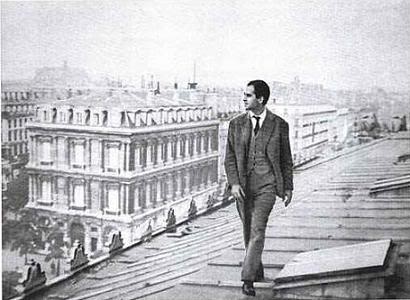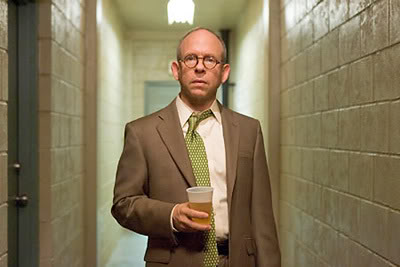"The critics who can’t break you / unwittingly, they make you." - Morrissey
Prologue - M. Night Shyamalan Goes Nutzo / Manny's Last Laugh
A martyr for the cause. Never forget.
In the most blood-pressure-popping, teeth-gnash-inspiring moment of M. Night Shyamalan's illiterate, arrogant summer flopparoo,
Lady in the Water (2006), the director sics a mythological monster that he made up on a snooty straw-man film critic played by Bob Balaban. It is clearly intended as comeuppance for a minor villain. It is staged as if it were a Stand-Up-and-Cheer! moment for the audience. The narrative justification is that the film critic has given sad-sack everyman Mr. Cleveland Heep (Paul Giamatti) bad information about how to identify mystical powers that lay dormant inside the residents of a Philadelphia apartment complex, and now the magical visiting Narf (Bryce Dallas Howard) is dying for The Critic's mistake.
Now, it would take a volume - and I hope such a book is written someday - to fully unpack the hubris on display in
Lady in the Water. It borders on psychosis. In the scene under discussion,
Lady fully leapfrogs over the border, jumpkicks the border, and shatters the border, and crosses into hateful insanity. The attack on the critic is a tactic (one among many in
Lady in the Water) to make the film uncriticizablee. It is predicated on a lengthy list of false assumptions, accusations, and primary misapprehensions.

Most insecure man in the world?
Why does Shyamalan need to lash out at critics at all, let alone in such an infantile way? Isn't this a man
Newsweek called "the next Spielberg"
on the cover of the magazine? Does Shyamalan imagine that popular summer movie audiences have such venom for critics that they will enjoy seeing one shredded in his movie? We are told - nay
ordered - in
Lady in the Water to view the story as a Fairy Tale, and with the rules of Fairy Tale narrative in place... where does petty revenge on film critics fit into the Fairy Tale model? Within the story itself, the critic has only answered questions asked of him by the misguided hero, not imposed his opinions on others with malicious intent, arrogance, or presumed authority on his own part. The misstep Cleveland Heep makes is in
misreading the information given to him by the critic: Heep asks what to characteristics to look for in an archetypical protective "Guild". The critic reluctantly answers, Heep accidentally misidentifies the mystic "Guild", and almost kills his savior-figure in the process. This is hardly the critic's fault, since in the end, his information was perfectly good, valid, and true. The critic could hardly be blamed, anyhow, since such an archetype, as presented and explained in
Lady, does not really exist. As always, Shyamalan's movies end up saying the opposite of the idea he intends.
The film critic in
Lady in the Water doesn't even offer film criticism, or evaluative opinions. The information he imparts is basic narrative theory, observation on story structure, and light analysis of mythological archetypes. Shyamalan has conflated a number of different film-writing jobs and purposes into "critics". Not that he understands film theory. Not that he has probably
read academic criticism or any film theory.
For some reason, the critic is named "Harry Farber", presumably after Manny Farber.
If M. Night Shyamalan thinks Manny Farber is a suitable stand-in for Every Movie Critic, pardon my French, but he's a fucking idiot, who's never read Manny Farber. That, or the guy is seriously nuts.
I. Everybody's a Critic: Toward De-Mystifying Film Criticism
Movie reviewers, critics proper, film historians, academic critics, film theorists, DVD reviewers, diarists, columnists, biographers, interviewers, industry reporters, etc. ... and etc. ... The entire family of persons who write and/or talk publicly about film have only the obvious in common, but otherwise undertake entirely different tasks, with different concerns. A misconception among non-film-literati is, sadly, that they all do roughly the same thing: review movies and tell you if they're "good" or not. Nearly every film text available on Amazon.com has riotously funny amateur User Reviews, should one scroll into the abyss: see people complain that David Skal's sociocultural analysis and reception study of American horror film and fiction,
The Monster Show is not a thorough historical "making of" reference, and doesn't cover European films... though neither is Skal's stated, explicit purpose. Witness the lament of the Pauline Kael one-star reviewer: "she doesn't like
Star Wars! Mrs. Kael obviously was in the wrong line of work. If you can't sit back and let the child in you enjoy 2 hours of well-crafted imagination than you can't be a legitimate critic of mainstream movies, can you? Jaded pretentious bores like Kael should just review 'Art' films." "The author struggles to make some kind of point in this book, unfortunately, neither she nor the reader can figure out what it is," moans a reader of Martha Nochimson's blazing, pioneering feminist study of David Lynch,
The Passion of David Lynch: Wild at Heart in Hollywood. These books are respectively a jaunty cultural history, a collection of challenging film reviews pitched to a popular but intelligent audience, and a strange and wonderful scholarly analysis of a film author's oeuvre. Except for possibly Nochimson's Lynch study, none are pitched in language or founded in ideas that cannot be readily grasped by a high school graduate with no institutional film schooling. All have simply been encountered by befuddled readers who are in way over their heads. The confused, angry responses are roughly analogous to Shyamalan's critic-massacre in
Lady in the Water.
Pity "Mrs. Kael", who was, of course, in the perfect line of work, wore maturity with pride, completely unconcerned about a "child living in her" (?!), didn't need legitimizing by anyone, and never particularly liked art films. Pity also, the poor readers who accidentally encounter a breed of film writing and simply cannot believe it exists.
Certain professional film writers, from Armond White to David Bordwell (maybe on the cranky-scale not so far apart, but certainly on the talent-o-meter), have been blogger-bashing in recent interviews, editorial pieces, some even in their regular-beat film writing. Some of them are plainly disgusted that non-pros think they can do the job, some seem to be
fearing for their jobs, and some are just unimpressed with the level of writing to be found in Blogland. The net result is that they sound like Amazon reviewers who ordered the wrong book.
(To be fair, Bordwell doesn't even mention film bloggers, just complains that "no one, as far as I know, is producing what I'd like to see," but is frustratingly vague about exactly what he wants to see. As a not-wise man once put it, then "neither [he] nor the reader can figure out what it is.")
I won't get very self-reflexive in this piece, but the by-design scattershot subject and tone of the
Exploding Kinetoscope blog is both a constant source of frustration and a liberating blessing for me. I would try to focus more, but... well, it's my blog. The idea is to reflect what it's like to get coffee with me and talk about movies. So some days it's jokes, some days reviews, some days news, some days polished textual analysis that I have worked on for a month. Some days I go read a book by myself.
The history of reportage and writing about film began with movie-love stricken intellectuals trying to defend the medium as worthy of any mental effort at all. Writing about film in any capacity, at that point in history, included the value judgment that film is
worth writing about.
The Ultimate Matrix Collection DVD includes two audio commentaries on each film. One track with Dr. Cornel West and controversial philosopher Ken Wilber, another with film critics Todd McCarthy, John Powers and critic/biographer/weirdo David Thomson. Indulge in all six commentaries to hear a hilarious cage-match of brainpower, in which three film critics are soundly, skull-crunchingly trounced. West and Wilber discuss history, consciousness, world religion, social politics, technology and art. The critics make snarky comments about how bored they are, and don't even demonstrate much fluency in film language or history. Frankly, they sound like they don't know very much about movies.
This is going someplace specific.
The Daily Reviewer Type (who births one-word poster blurbs), and the print columnist critic with a little more elbow room (who births full-sentence poster blurbs), whether shallow or insightful, taste the wrath of cinephiles and filmmakers because they too often seem to offer a consumer report approach to art. It can be wearying, and possibly unhealthy for the medium and for viewers. This danger lies in the presentation of the separateness of a critic's expertise, when it is better regarded as a mark along a continuum of how all audiences evaluate film.
That school of criticism remains interesting to people, because it is a slightly elevated version of how they experience and discuss movies, whether they realize it or not. "What did you see this weekend? Yeah? Oh, how was it? Cool, I'll check it out." With hope, the professional version is articulate, and the critic will have the virtue of seeing a more films than the average reader, and sooner. Everybody goes to movies. Everybody has opinions, and potentially has insights about the movies. The critic's opinion isn't unassailable; they're in print and being paid because they - again, with hope - are informed about film, and have the ability to organize their thoughts. Pro critics complaining about impudent bloggers don't understand the function of blogging, or even film review websites. They are, in effect, trying to tell the world not to talk about movies without permission. From the Blogosphere to Ain't It Cool News to
24 Lies a Second, internet film writing is about taking the unnecessary mystique out of talking constantly about film. It's an electronic coffeeshop table discussion. Some bloggers would undoubtedly take issue with this, since it willfully delegitimizes the medium. So be it. That there are dozens of fine bloggers who could do Armond White's job better is beside the point. When M. Night Shyamalan kills a man for having opinions about films, he's killing everyone in his audience.
If you're reading this, and more importantly, if you're
not reading this: you are a practicing movie critic. Deal with it.
II. I'll Tell You What to Think: Toward Re-Mystifying Film Criticism

The argument above is admittedly facile and obvious: "everybody's a critic" interpreted as optimistic populism. Below is... something else. Everybody is a critic, but they are not all good critics. They are not all smart critics. Everybody is certainly not a writer. It is not the inherent fineness of thought that separates the film critic's work from the filmgoer's conversation. Their intersecting spheres remain separate because of the writer's applied skills, education, and dedication to the practice of thinking and talking about film in regular, thorough manner.
Most film-blogging necessarily falls into the non-scholarly categories of review, op-ed, news, and film appreciation, because the immediacy of the medium largely excludes extensive textual analysis, position papers, academic discussion. Those sort of pieces take a long time to write, and the reality of production makes them too precious to "waste" on blogs for most writers. So the majority of bloggery resembles the work of the published newspaper critic, but without credential, credibility or the benefit/constraints of an editor. Confession: I cheated. It's the process of "reviewing" that should be made less mysterious, and criticism should reclaim its potential power.
The great film critic exerts intellectual muscle-mass and illuminates the subject under scrutiny. Beyond that, pick your poison; the truly great critic diagrams his own boxing ring, and fights a fight you haven't seen before. That doesn't necessarily involve flashier writing, formal experimentation, more acerbic opinions, more discerning, or even more open-minded taste. But it can involve any of those things. The great ones may be sharp and insightful or receptive and interpretive, cold, warm, but they will be separate. The future of popular film criticism is going to look just like its past: a smattering of remarkable, defining work amid a gray wash of lightweights thinking they're doing the same job. Do not despair of this. Stand in the warm spots.
The deck is stacked against the film critics on the
Ultimate Matrix Collection commentaries. Mr. McCarthy is not the film-writing equivalent of Dr. West. Academic writers could have been summoned for the task, but these review-critics are not involved in the same practice as scholars. They aren't smart enough to fulfill the requirements of Great Critics and illuminate the complex text in any way, which may be expected. They are, however, pathetically unable to support even their knee-jerk reactions as viewers. A willingness and ability to discuss the how-and-why of his opinions is what separates the competent critic from any other moviegoer. The Great Critic is allowed, and welcome to bury us under a mountain of opinion, because their opinions are better-expressed, supported, pleasurable and stimulating to experience, while the bad critic, the average critic and the man-on-the-street schmuck's opinions are not. The Great Critic makes the reader a better viewer and critic in the process.
That is, ultimately, all I've got. The quality that makes a critic is a willingness to fearlessly, openly criticize. Whether this is Andrew Sarris making mincemeat of auteur theory by ranking and canonizing directors like a kid organizing baseball cards, or popular Roger Ebert insisting unpopular
Dark City is the best film of 1998, or Bazin sweating over the politics of editing dialectics, these forward-thinking opinions matter for their originality, the insistence, acumen and passion of expression.
All film writing, even the theoretical and historical, involves tastemaking in some capacity. The critic is a writer who should engage the task of opinion-cultivation full-on, with force and conviction. The critic must say the cruelest thing, the extreme thing, the strangest thing, must contribute that thought which only he is qualified, and able to give: opinion flanked by brain and gut. Everyone else is just a reviewer. May they all be eaten alive.
Andrew Horbal's Film Criticism Blog-a-Thon, gloriously vast in scope, lasts all weekend long at his entertaining No More Marriages! blog. His definitions are blurry (" I regard film criticism as simply the larger conversation about film"), but inclusive and positive. Check it totally out.









